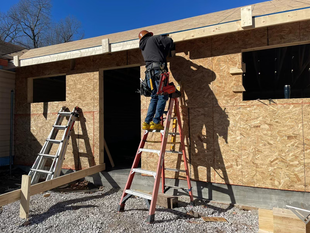
The Impact of AI and Machine Learning on Construction
1
19
Artificial Intelligence (AI) and Machine Learning (ML) are revolutionizing the construction industry, bringing unprecedented efficiency, safety, and innovation. These technologies enable predictive analytics, design optimization, and automation, significantly transforming how construction projects are planned, executed, and managed. As the construction sector increasingly adopts AI and ML, understanding their applications and benefits becomes crucial.

Applications of AI in Construction
Predictive Analytics for Project Management AI-driven predictive analytics enhance project management by forecasting potential issues and delays. By analyzing historical data and current project conditions, AI algorithms can predict future outcomes, helping project managers make informed decisions. This proactive approach minimizes risks, improves scheduling, and ensures timely project completion.
AI-Driven Design Optimization AI and ML algorithms optimize building designs by analyzing vast datasets and suggesting improvements. These technologies can evaluate structural integrity, energy efficiency, and material usage, leading to more sustainable and cost-effective designs. AI-driven design tools also facilitate collaboration among architects, engineers, and contractors, streamlining the design process.
Automated Construction Machinery Automation is a game-changer in construction, with AI-powered machinery performing tasks that are dangerous, repetitive, or labor-intensive. Drones, autonomous vehicles, and robotic arms are increasingly used for site inspections, material transport, and bricklaying. These machines enhance precision, reduce labor costs, and improve overall site safety.
Benefits of AI in Construction
Enhanced Efficiency and Productivity AI technologies streamline construction processes, increasing efficiency and productivity. Automated machinery accelerates task completion, while predictive analytics optimize resource allocation and project scheduling. This efficiency reduces downtime and accelerates project timelines, leading to cost savings and higher profitability.
Improved Safety on Construction Sites Safety is a critical concern in construction, and AI technologies significantly enhance site safety. AI-powered surveillance systems monitor sites in real-time, detecting hazards and alerting workers to potential dangers. Wearable devices equipped with AI track workers' health and safety, preventing accidents and ensuring compliance with safety protocols.
Cost Savings and Budget Management AI helps manage construction budgets more effectively by predicting costs, optimizing resource use, and reducing waste. Predictive analytics provide accurate cost estimates and identify potential budget overruns, allowing for proactive financial management. This precision ensures projects stay within budget, enhancing profitability and client satisfaction.
Case Studies
Successful Implementation of AI in Construction Projects Several construction projects have successfully integrated AI technologies, demonstrating their transformative potential. For example, a large-scale infrastructure project in Asia used AI-powered predictive analytics to manage complex scheduling, resulting in significant time and cost savings. Similarly, a residential development in Europe leveraged AI-driven design tools to create sustainable, energy-efficient buildings.
Lessons Learned from AI Integration The integration of AI in construction projects offers valuable lessons. Early adoption and comprehensive training are essential for maximizing the benefits of AI technologies. Additionally, continuous monitoring and updating of AI systems ensure they remain effective and secure. Learning from these experiences helps the construction industry navigate the challenges of AI integration and leverage its full potential.
Challenges and Considerations
High Initial Investment Implementing AI technologies in construction requires
significant initial investment. The costs of acquiring and maintaining advanced machinery, software, and skilled personnel can be substantial. However, the long-term benefits, including efficiency gains and cost savings, often justify the initial expenditure.
Data Privacy and Security Concerns AI technologies rely on vast amounts of data, raising concerns about privacy and security. Protecting sensitive information and ensuring compliance with data protection regulations are critical. Robust cybersecurity measures and transparent data management practices are essential for mitigating these risks.
Workforce Training and Adaptation The adoption of AI in construction necessitates workforce training and adaptation. Workers need to acquire new skills to operate and maintain AI-powered machinery and software. Providing comprehensive training programs and fostering a culture of continuous learning are crucial for successful AI integration.
Future of AI in Construction
Emerging Trends and Technologies The future of AI in construction is promising, with emerging trends and technologies poised to further transform the industry. Advances in AI-driven robotics, autonomous vehicles, and smart building systems will continue to enhance construction processes. The integration of AI with other technologies, such as blockchain and the Internet of Things (IoT), will drive innovation and efficiency.
Predictions for AI Adoption in the Industry AI adoption in construction is expected to accelerate, with increasing investments and technological advancements. Industry experts predict widespread use of AI for project management, design, and automation. As AI technologies become more accessible and affordable, their adoption will expand, driving the construction industry's evolution toward a smarter, more efficient future.
FAQs
1. How are AI and machine learning used in construction? AI and machine learning are used in construction for predictive analytics, design optimization, and automation of machinery, enhancing efficiency, safety, and productivity.
2. What are the benefits of AI in construction? The benefits of AI in construction include improved efficiency, enhanced site safety, cost savings, and better budget management through optimized resource use and predictive analytics.
3. What challenges does the construction industry face with AI integration? Challenges include high initial investment costs, data privacy and security concerns, and the need for workforce training and adaptation to new technologies.
4. Can you give examples of successful AI implementation in construction? Successful examples include large-scale infrastructure projects using AI for scheduling and residential developments leveraging AI for sustainable design, resulting in significant time and cost savings.
5. What is the future of AI in construction? The future of AI in construction involves further advancements in robotics, autonomous vehicles, smart building systems, and the integration of AI with other technologies like blockchain and IoT, driving continued innovation and efficiency.






